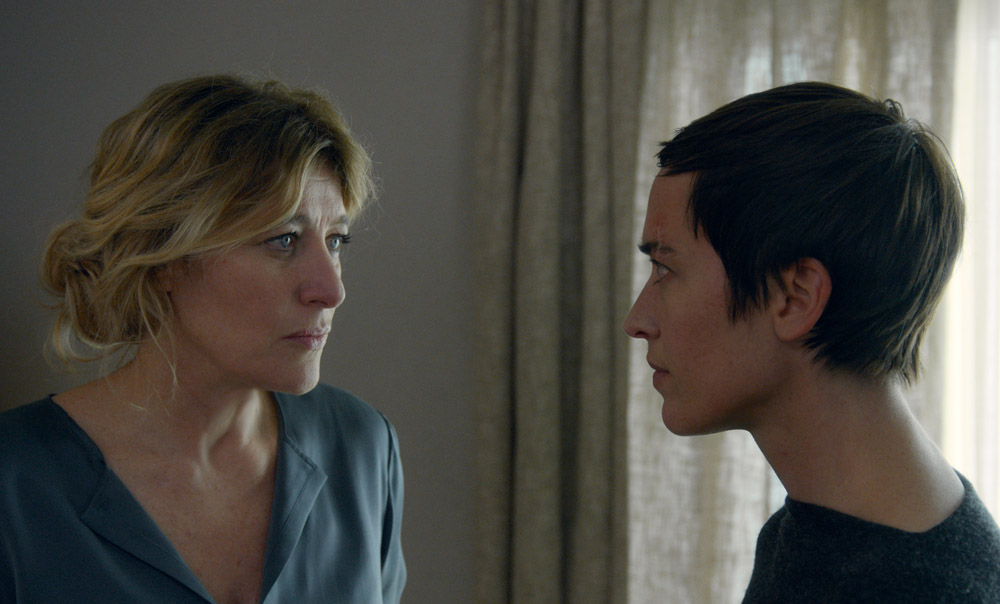“I will go faster because it’s true that I’m not such a speedy director,” Ursula Meier promises me towards the end of our conversation about “The Line,” her first feature in nearly a decade, though I assure her all the time she puts into her projects makes it onto the screen. It’s not like the writer/director hasn’t been busy, making a variety of work from short-form documentaries to the occasional foray into television, but the occasion of a new drama from the Swiss filmmaker is truly an event, one that has been duly recognized by the Metrograph in New York with a full retrospective of her work both in theater this week and online through April with Metrograph at Home.
In many ways, “The Line” actually does feel like a culmination of the filmmaker’s skills and preoccupations as it concerns a family that’s been completely destabilized by the anger of its eldest daughter Margaret (Stéphanie Blanchoud), who is introduced as being responsible for a hailstorm of broken dishes and vinyl records tossed at her mother Christina (Valeria Bruni Tedeschi) before being thrown out of the house herself. The incident leads to a restraining order where she’s forbidden from coming within 100 meters of the house, a perimeter that her youngest sister Marion (Elli Spagnolo) decides to actually paint around the property as much to protect their mother as to keep Margaret from endangering herself when this recent fit of rage could easily repeat itself.
Meier, who has long excelled at expressing the distance that people place between one another and how it can be imposed by their environment, revisits the snow-covered countryside of her 2012 feature “Sister” where the chill in the air seems unlikely to lift around the Celestini family in which a love of music has been passed down from one generation to the next, but so has a sense of fury when Christina clearly resents the fact she had to give up a once-promising career as a pianist once she had children. All have had to acclimate to having a mother who appears as if she didn’t want to become one in the first place, with none taking it so poorly as Margaret, whose actions become a physical manifestation of the emotional violence that’s been visited upon her throughout the years.
Tragedy may unfold as both Margaret and Christina can’t fathom what the other wants from them, leaving Marion and her other sister Louise (India Hair) in the lurch as potential peacemakers, but “The Line” is electrifying when Meier remains without peer when illustrating the things that cannot be said, observing how blood ties have tripped up all of them from becoming the people they’d like to be and approaches such delicate subject matter without compromise and a fearless ensemble of actors. While in New York where the film begins its U.S. theatrical run, Meier spoke about how she set out to tell a story she had never seen before on screen, finding inventive narrative uses for music beyond its sonic qualities and the scene that required multiple takes when it proved to be so emotional for the cast.
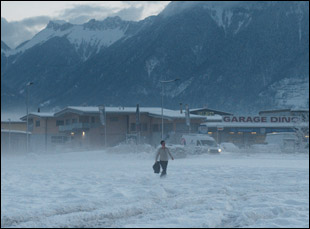
Yes, I shot a [music] video with Stéphanie because she’s an actress but also a singer, and the video was about a couple who separate and I shot it in a boxing ring, so it was like a fight but with love and there’s a story that she started after the separation to box, not as a professional, but she found something [useful] in the sport, so we were very interested in violence and we decided to make a film together. Very quickly, we had the idea of a woman who was fighting because feminine violence is rare [to see onscreen], and usually, it’s with very rebellious teenagers, or for an adult, there is always another theme [such as] drugs or prostitution, and fighting is a consequence. But I don’t have a memory of a film that talks about a woman who is fighting like a man, and we decided to make a kind of Swiss Western, not with a cowboy, but a woman that fights physically like a cowboy.
That was a [point of] departure for the movie, of the idea of the movie, and after working with Stéphanie [initially], we decided she should [depart the] writing because she needed to have the distance to embody the character and discover the story, and I wrote with my traditional co-writer Antoine Jaccoud, who I worked with on “Home” and “Sister.”
The idea of music is used in such a fascinating way as an expression of the relationships within the family – Margaret is a musician like her mother, but plays a different instrument. She plays an electric guitar that Marion has to hold onto the amp for after she’s left the house. Was that interesting to develop as part of the story?
Yeah, because Stéphanie is a singer too, the music is a link between the characters and at first, I said it could be great if she’s a singer like you because it could give another point of view on the character. Suddenly, [Margaret] appears more fragile. She [could] put words on what she’s feeling because when she sing, there are words and not fighting. I don’t know exactly why, but when I said this to Stephanie, she didn’t want to, maybe because she just wants to acts in the movie or maybe because she’s modest. But at last I can convince her to sing in the movie and after that, we had the idea of the mother as a pianist as a resonance with Margaret singing and that was great because during the movie when the piano [leaves] the house [because] the mother stops [playing], Margaret [begins to] gives herself the permission to sing.
Because of her past boyfriend, who is played by Benjamin Biolay, who helps her to go on the set and to sing again, she can continue singing without the mother [holding her back], so that was important, and [it was important as well] to Marion, the little sister, who sings more Christian songs. I also like the idea that there is the song that Margaret will sing at the end is in work in progress [throughout the movie] because at first she has the melody, but she don’t have the words, and we don’t see the process [explicitly], but the art piece is in construction during the film.
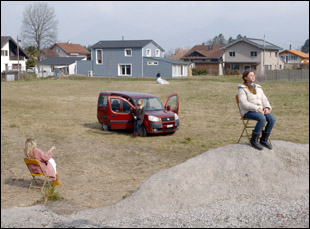
It was very funny because it was important for me that this character was embodied by a real singer, not an actor and Benjamin is also an actor, but he’s a singer first, so when Benjamin accepted [a part] in the movie, I asked him if he could compose a song that can reveal the past love story between [his character and Margaret], and Benjamin said, “Okay,” so [he created the song] during the shooting and when he came to set for the first time — we shot all his scenes at the end,” he says, “Okay, I have something, a little thing I don’t know..” and I say, “Okay, go on.” And he has his guitar and he starts playing, and I was so moved by the song. I say, “Okay, that’s great,” and I was very, very happy.
The timing of that is interesting as well since from what I understand, the first scene in the film, which is the violent encounter between Margaret and Celestina was the first scene you actually shot. Did you think about how the schedule might impact the performances?
Yes, that’s true. It was very important for me to start with this first scene with a climax of violence the first day because for all the actors and actresses, and also for the technicians — for example, [my cinematographer] Agnes Godard — just to say, okay, the level of the violence is there, and after, these are the consequences of this scene. And it was important for Stéphanie because she has to feel the violence through her body and she’s said also she really needed that [scene to] go very quickly into the character with the first day and it was also very important for the character of Marion, the little sister, because when saw the fighting, she’s terrified and very afraid that it could happen again, [which is why] she paints the line because she’s in control of the border in a way and [can] say, “Margaret, you can’t go through the line” because she saw the level of violence.
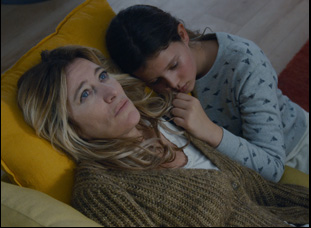
Not so much, but what was very interesting for Stéphanie and Valeria is that they are in the first scene and they are in the last scene and of course, they try to meet in the middle, but Valeria’s character [Christina] doesn’t see her daughter when she comes back home on Christmas, so for the first scene, it was great because when the camera was on Stéphanie, [Valeria] said very terrible things [about Margaret] to give the energy to Stéphanie to break everything in the home – it’s not in the movie, it’s [only] for the actress. And it was beautiful how they work together, also with India Air [who plays Louise, the other daughter in the family].
[In the rehearsals] we’d go deeper in the character and in the situation, but for example, the moment when Valeria, as the mother, listens to the CD she made [as a pianist years ago] when [she and Marion] are waiting in the car for Margaret to come back, was very important for me because I said to Valeria, “Your character is a toxic, totally egocentric mother, but at this moment for me, it’s maybe the only moment that the spectator could have some empathy with you because you realize you had to break your career as a pianist not because of your daughter, but because of yourself,” and at this moment, she’s crying. When she listens [to herself playing], she can understand that she lost a lot of things — of course, her career, but also maybe with Margaret, she’s never been a mother.And it was long process of writing [to get to the ending] because it was very difficult to find a right mood to close the movie because it’s not a happy end. In a way, it’s happy for Margaret because she will not wait for [her mother’s] love, but we are left waiting for the mother and Margaret to talk, and it’s terrible because even the mother wants to, she can’t. So this [earlier] moment in the field when she listens to CD, I said to Valeria that it’s very important that at this moment, the spectator could be moved by her. It’s the only moment in the film. [laughs] And for the actresses, it was great because we put the piano [outside] and I shot the [scene] first with India [Hair] before we shot on Valeria’s [side], and Valeria was so strong [as an actor] and so fragile [as a character] at this moment that India said, “Sorry, can we do the shot on me [again] because I was so moved to see Valeria in this,” so we shoot again on India.
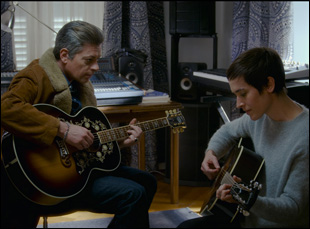
It’s huge. It’s incredible because it’s a big honor, and I’m very, very moved. My new film, [which] I’m in a scriptwriting [stage], will be an American movie — I don’t know if I will shoot there, but it will be with US actors — so I’m very moved to see that Metrograph offers me this beautiful retrospective. And I was in New York for the first time with my first movie, a TV film “Strong Shoulders” that was well-received and [made it into] New Directors/New Films, and after we presented “Home” with Isabelle Huppert and Agnes Godard, and when “Sister” was shortlisted for the Oscar, I was there with Kacey Mottet-Klein – and I just met with Kasey today, and he couldn’t speak English [then]. He just [knew] a few words when he was 12 years old, but now he’s an adult and he speaks so well, and I [said to him], “Oh my God, you’re so good in English and I don’t progress. It’s terrible.” [laughs] But now with “The Line,” I have this long history with New York because all my films were screened here, and it’s a beautiful gift.
“The Line” opens on March 31st in New York at the Metrograph as part of the retrospective “Permeable Boundaries: The Films of Ursula Meier,” running through April 2nd in theater with screenings of “Sister” (April 1st) and “Home” (April 1st and 2nd) and streaming through April on Metrograph at Home with shorts “Kacey Mottet Klein: Birth of an Actor” and “Quiet Mujo”.




